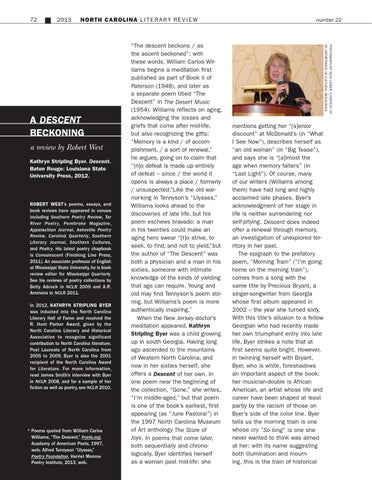72
2013
NORTH CAROLINA L I T E R A R Y RE V I E W
a review by Robert West Kathryn Stripling Byer. Descent. Baton Rouge: Louisiana State University Press, 2012.
Robert West’s poems, essays, and book reviews have appeared in venues including Southern Poetry Review, Tar River Poetr y, Pembroke Magazine, Appalachian Journal, Asheville Poetry Review, Carolina Quarterly, Southern Literary Journal, Southern Cultures, and Poetry. His latest poetry chapbook is Convalescent (Finishing Line Press, 2011). An associate professor of English at Mississippi State University, he is book review editor for Mississippi Quarterly. See his reviews of poetry collections by Betty Adcock in NCLR 2009 and A.R. Ammons in NCLR 2011. In 2012, Kathryn Stripling Byer was inducted into the North Carolina Literary Hall of Fame and received the R. Hunt Parker Award, given by the North Carolina Literary and Historical Association to recognize significant contribution to North Carolina literature. Poet Laureate of North Carolina from 2005 to 2009, Byer is also the 2001 recipient of the North Carolina Award for Literature. For more information, read James Smith’s interview with Byer in NCLR 2008, and for a sample of her fiction as well as poetry, see NCLR 2010.
* Poems quoted from William Carlos Williams, “The Descent,” Poets.org, Academy of American Poets, 1997, web; Alfred Tennyson “Ulysses,” Poetry Foundation, Harriet Monroe Poetry Institute, 2013, web.
photograph by Nick Lanier; courtesy of NC Department of cultural resources
A Descent Beckoning
“The descent beckons / as the ascent beckoned”: with these words, William Carlos Williams begins a meditation first published as part of Book II of Paterson (1948), and later as a separate poem titled “The Descent” in The Desert Music (1954). Williams reflects on aging, acknowledging the losses and griefs that come after mid-life, but also recognizing the gifts: “Memory is a kind / of accomplishment, / a sort of renewal,” he argues, going on to claim that “[n]o defeat is made up entirely of defeat – since / the world it opens is always a place / formerly / unsuspected.”Like the old warrior-king in Tennyson’s “Ulysses,” Williams looks ahead to the discoveries of late life, but his poem eschews bravado: a man in his twenties could make an aging hero swear “[t]o strive, to seek, to find, and not to yield,”but the author of “The Descent” was both a physician and a man in his sixties, someone with intimate knowledge of the kinds of yielding that age can require. Young and old may find Tennyson’s poem stirring, but Williams’s poem is more authentically inspiring.* When the New Jersey doctor’s meditation appeared, Kathryn Stripling Byer was a child growing up in south Georgia. Having long ago ascended to the mountains of Western North Carolina, and now in her sixties herself, she offers a Descent of her own. In one poem near the beginning of the collection, “Gone,” she writes, “I’m middle-aged,” but that poem is one of the book’s earliest, first appearing (as “June Pastoral”) in the 1997 North Carolina Museum of Art anthology The Store of Joys. In poems that come later, both sequentially and chronologically, Byer identifies herself as a woman past mid-life: she
number 22
mentions getting her “[s]enior discount” at McDonald’s (in “What I See Now”), describes herself as “an old woman” (in “Big Tease”), and says she is “[a]lmost the age when memory falters” (in “Last Light”). Of course, many of our writers (Williams among them) have had long and highly acclaimed late phases. Byer’s acknowledgment of her stage in life is neither surrendering nor self-pitying. Descent does indeed offer a renewal through memory, an investigation of unexplored territory in her past. The epigraph to the prefatory poem, “Morning Train” (“I’m going home on the morning train”), comes from a song with the same title by Precious Bryant, a singer-songwriter from Georgia whose first album appeared in 2002 – the year she turned sixty. With this title’s allusion to a fellow Georgian who had recently made her own triumphant entry into late life, Byer strikes a note that at first seems quite bright. However, in twinning herself with Bryant, Byer, who is white, foreshadows an important aspect of the book: her musician-double is African American, an artist whose life and career have been shaped at least partly by the racism of those on Byer’s side of the color line. Byer tells us the morning train is one whose cry “So long” is one she never wanted to think was aimed at her: with its name suggesting both illumination and mourning, this is the train of historical
